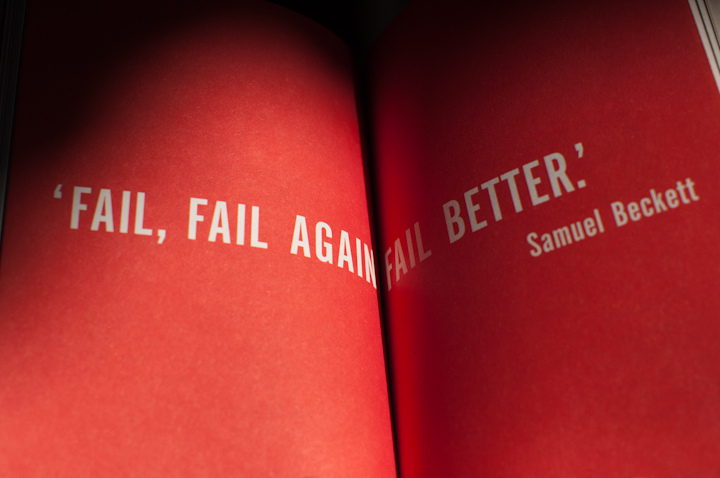There was a time when I embraced Beckett’s quote. The rejection slips I received during my college days – and long thereafter – were stark reminders of the difficult road ahead of me as a young writer, one that demanded I put in the hard work if I hoped to get better.
Yet a strange phenomenon has appeared across the books, blogs and posts we read in the last few years. Failure, something that nobody wanted to be associated with, recently has become a badge of honor of sorts. People are more comfortable wearing failure on their sleeve and talking about it as part of their incredible catapult to success.
This new romanticism around failure is cloaked in a faux sense of vulnerability. Talking about past failures is much different than staring adversity smack in the face, and few are the people who stand up and embrace or even entertain the idea of failure as it unfolds.
Failure has become a popular plot line for storytelling. It also has become a disingenuous narrative.
It seems as though ‘failure is the new success’ has become an acceptable way in which to masquerade our self-righteous and narcissistic ways, and proclaim our greatness as pure grit…so long as a little light is cast upon the missteps.
That’s not to say failure isn’t real. Things do fail. And people sometimes do fail us. However, failure is being thrown around in ways that seem all too trivial and misguided, giving any misstep #EpicFail clout and providing us with an out or permission to quit. Worse, it’s becoming part of a narrative that ends with a predictable conclusion of success. At Joy Venture, we’re of the mind that we should abandon the failure narrative and instead write a more honest one.
For example, perhaps you’ve seen the inspirational quote, post or infographic with Colonel Harland Sanders, founder of Kentucky Fried Chicken, and how his secret recipe was rejected a whopping 1,009 times. We don’t buy this as a failure narrative despite its current packaging. If anything it is a story of perseverance, of finding the right people who believed in his idea, and of relentless hard work. We should acknowledge the effort for what it is.
Failure is not part of the joy narrative.
After a few years assisting startups in two different business incubators, I became wise to a disheartening trend. Months after mentoring passionate entrepreneurs, I learned many had abandoned their “big idea” and were off doing something completely different. There are a variety of reasons for abandoning an business venture , and Gallup confirms many of the trails of startups. Perhaps they weren’t making money, or securing venture capital, or scaling fast enough, or destined to be bought out. Perhaps it was the lure of being the boss (or running from other bosses). Or maybe they simply underestimated the difficulty, determination and patience needed to grow a business the old fashion way: year after year after long and toilsome year, without of the euphoria of instant success.
In contrast, there are joy ventures.
Again and again through podcast interviews on Joy Venture, we’re finding that people don’t fail at what they truly love. That’s not to say they don’t experience setbacks or grow in new and surprising directions. Rather they gravitate toward and lean into those things they love and what they believe they were created to do, regardless of the challenges. They refuse to let obstacles become mile markers on some imminent road of failure. Instead, they persevere.
There’s a stark difference in pursuing an opportunity and pursuing your joy. When things get awkward and sideways, we tend to go looking for new opportunities. It’s the opposite with joy. We don’t find ourselves cutting bait and running the other direction.
While opportunities and ideas emerge within the context of pursuing your joy, they don’t define your joy venture.
So what are you pursuing: opportunities or joy? The end result or the act of doing something meaningful?
Persistence pays off
My early and ongoing lack of success as a writer didn’t plummet me into despair or encourage me to quit, it focused my resolve: Write more. Write better. Find my voice. Learn the rules. Break the rules. Discern who would be responsive to my quirky style of prose. Stay engaged and don’t give up.
By doing this, the literary and academic journals that I admired were starting to publish my work. It didn’t happen in 12 weeks or even 12 months. Instead, it took 12 long years. To characterize those dozen years as failure is to discard everything learned and the discoveries that emerged during that time. It was and still is a joy venture. I just didn’t know to call it that at the time.
Romanticizing failed opportunities is easy – anyone can do it. Take a different path.
Joy, on the other hand, is about discovery and development. In essence, it’s always a work in progress. Pursue it and you’ll have a treasure trove of stories about the journey and the progress – the kind we all yearn for and desire to share with others.
Originally published on the Joy Venture blog.


